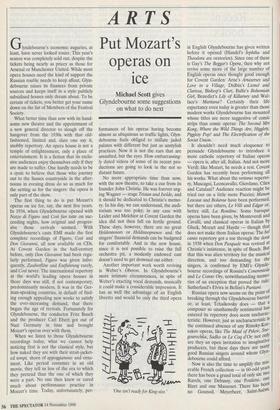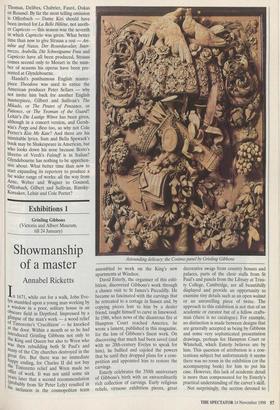ARTS
Put Mozart's
operas on ice
Michael Scott gives Glyndebourne some suggestions on what to do next Glyndebourne's economic auguries, at least, have never looked rosier. This year's season was completely sold out, despite the tickets being nearly as pricey as those for Arsenal or Manchester United. While most opera houses need the kind of support the Russian rouble needs to keep afloat, Glyn- debourne raises its finances from private sources and keeps itself in a style publicly subsidised houses only dream about. To be certain of tickets, you better get your name down on the list of Members of the Festival Society.
What better time than now with its hand- some new theatre and the appointment of a new general director to slough off the hangover from the 1930s with that old- fashioned, limited and, dare one say it, snobby repertory. An opera hciuse is not a temple of enlightenment, only a place of entertainment. It is a fiction that its exclu- sive audiences enjoy themselves only if they are made to suffer. One hardly needs to be a cynic to believe that those who journey out to the Sussex countryside in the after- noons in evening dress do so as much for the setting as for the singers: the opera is only part of the show.
The first thing to do is put Mozart's operas on ice for, say, the next five years. In 1934, when Glyndebourne opened with Nozze di Figaro and Cosi fan tutte on suc- ceeding nights, how original and progres- sive those revivals seemed. With Glyndebourne's casts EMI made the first complete recordings of Figaro, Cosi and Don Giovanni, all now available on CDs. At Covent Garden in the half-century before, only Don Giovanni had been regu- larly performed, Figaro was given infre- quently, ZauberflOte and Entfiihrung rarely, and Cosi never. The international repertory at the world's leading opera houses in those days was still, if not contemporary, predominantly modern. It was in the Ger- man-speaking countries, in default of find- ing enough appealing new works to satisfy the ever-increasing demand, that there began the age of revivals. Fortunately for Glyndebourne, the conductor Fritz Busch and the producer Carl Ebert got out of Nazi Germany in time and brought Mozart's operas over with them.
When we listen to those Glyndebourne recordings today, what we cannot help noticing first is not the classical style, but how naked they are with their strait-jacket- ed tempi, shorn of appoggiaturas and orna- ment. Like period costumes in an old movie, they tell us less of the era to which they pretend than the one of which they were a part. No one then knew or cared much about performance practice in Mozart's time. Today, unfortunately, per- formances of his operas having become almost as ubiquitous as traffic lights, Glyn- debourne feels obliged to titillate jaded palates with different but just as unstylish practices. Now it is not the ears that are assaulted, but the eyes. How embarrassing- ly dated videos of some of its recent pro- ductions are going to look in the not so distant future.
No more appropriate time than now, with the new theatre, to take a cue from its founder John Christie. He was forever urg- ing Wagner — stage Tristan and Isolde, and it should be dedicated to Christie's memo- ry. In his day, we can understand, the audi- torium was too poky; in any case with Leider and Melchior at Covent Garden the idea did not then fall on fertile ground. These days, however, there are no great Heldentenors or Heldinsopranos and the singers' financial demands can be budgeted for comfortably. And in the new house, since it is not possible to raise the full orchestra pit, a modestly endowed cast doesn't need to get drowned out either.
Another important work worth reviving is Weber's Oberon. In Glyndebourne's more intimate circumstances, in spite of Weber's exacting vocal demands, musically it could make a considerable impression. It has as well the advantage of an English libretto and would be only the third opera `One isn't ready for King-size.' in English Glyndebourne has given written before it opened (Handel's Jephtha and Theodora are oratorios). Since one of these is Gay's The Beggar's Opera, then why not revive some more of the large number of English operas once thought good enough for Covent Garden: Arne's Artaxerses and Love in a Village, Didbin's Lionel and Clarissa, Bishop's Clari, Balfe's Bohemian Girl, Benedict's Lily of Killarney and Wal- lace's Maritana? Certainly their life expectancy even today is greater than those modern works Glyndebourne has mounted whose titles are more suggestive of comic strips than comic operas: The Second Mrs Kong, Where the Wild Things Are, Hi.tt:lety, Pigglety Pop! and The Electrification of the Soviet Union.
It shouldn't need much eloquence to persuade Glyndebourne to introduce a more catholic repertory of Italian operas — opera is, after all, Italian. And not more Verdi; like Mozart, he needs a rest. Covent Garden has recently been performing all his works. What about the verismo reperto- ry, Mascagni, Leoncavallo, Giordano, Cilea and Catalani? Audience reaction might be tried out on a little more Puccini; Manors Lescaut and Boheme have been performed, but there are others, Le Vi Ili and Edgar or, better still, La Rondine. Some baroque operas have been given, by Monteverdi and Cavalli, and classical operas in Italian by Gluck, Mozart and Haydn — though that does not make them Italian operas. The bel canto repertory got a toe through the door in 1938 when Don Pasquale was revived at Christie's insistence, in spite of Busch. But that this was alien territory for the musical direction, and too demanding for the singers, is confirmed by EMI's Glynde- bourne recordings of Rossini's Cenerentola and Le Comte Ory, notwithstanding memo- ries of an exception that proved the rule: Sutherland's Elvira in Bellini's Puritani. Russian opera now seems on the point of breaking through the Glyndebourne barrier or, at least, Tchaikovsky does — that a composer so unashamedly sentimental has entered its repertory does seem uncharac- teristic. However, just as uncharacteristic is the continued absence of any Rimslcy-Kor" sakov operas, like The Maid of Pskov, Sne- gourochka, Sadko or Le Coq d'Or; not only are they an open invitation to imaginative producers, but these days there are many good Russian singers around whom Glyn- debourne could afford. Now is also the time to amplify the mis- erable French collection — in 60-odd years there has been a grand total of only six: tvv° Ravels, one Debussy, one Poulenc, one Bizet and one Massenet. There has been no Gounod, Meyerbeer, Saint-Saens, Thomas, Delibes, Chabrier, Faure, Dukas or Roussel. By far the most telling omission is Offenbach — Dame Kiri should have been invited for La Belle Helene, not anoth- er Capriccio — this season was the seventh in which Capriccio was given. What better time than now to give Strauss a rest —Ari- adne auf Naxos, Der Rosenkavalier, Inter- mezzo, Arabella, Die Schweigsame Frau and Capriccio have all been produced, Strauss comes second only to Mozart in the num- ber of seasons his operas have been pre- sented at Glyndebourne.
Handel's posthumous English master- piece Theodora was used to entice the American producer Peter Sellars — why not invite him back for another English masterpiece, Gilbert and Sullivan's The Mikado, or The Pirates of Penzance, or Patience, or The Yeoman of the Guard? Lehar's Die Lustige Witwe has been given, although in a concert version, and Gersh- win's Porgy and Bess too, so why not Cole Porter's Kiss Me Kate? And there are his Inimitable lyrics. Sam and Bella Spewack's book may be Shakespeare in American, but who looks down his nose because Boito's libretto of Verdi's Falstaff is in Italian? Glyndebourne has nothing to be apprehen- sive about. What better time than now to start expanding its repertory to produce a far wider range of works: all the way from Arne, Weber and Wagner to Gounod, Offenbach, Gilbert and Sullivan, Rimsky- Korsakov, Lehar and Cole Porter?



















































































 Previous page
Previous page